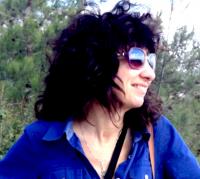"Passaic River in Paterson," "A Sketch," and "To An Atlantis"
Passaic River in Paterson
It becomes dark forever at 6.30
as I'm the only one to get off at my station,
warm train taking the light away
to stars. In the west, Passaic
rustles its winter waters in the leafless world
as I walk the resounding mile
from this platform to the car parked on the bridge's east end
in December,
and down the river, the invisible snowless Jersey towns
light up like a chain of alcohol burners,
the halos over them - what color are they? -
grayish orange like ashes
hover
squashed with blackness above them
- that's where skies are.
Traffic lights shine from bushes,
steppe wolves.
Passaic, Passaic! Your quiet but hissing name is
like Mongol campfires
squeezing the fortress
I am the last one to defend.
The cold cars on the hill darker than skies
look like empty tin hats
on soldiers' graves.
As I, with the hill and this town and
asteroid lit by its blurry tide-moving companion
–– I am coasting in space,
I'm flying away with the earth as I climb up all the way to the top,
as I reach for the key,
unstick the icy hundred-ton door
with my bare fingers
and ignite the still
frozen heart.
A Sketch
They leave - and then don't leave,
tawny, they fall
but pause. At noon
Jonathan Schwartz says: Here is Sinatra.
They leave
and write their letters, postcards -
each rusty leaf
alive, et cetera.
They linger, want to stay,
and give a reason - a remark, a notion,
or, say, regret, or
explanation. For
December comes and nothing to explain
or bear
or let alone to love,
but footsteps on the snow
or radio -
thin threads in cracked air.
To An Atlantis
Fleet left. Towers
are rising from waters
- and sink again:
Grand Central of the sea -
its bottle glass of empty
deep terminals, and foamless
passages, and shoals of baby fish...
Brave Herodotus had it described, it’s just
the illustrations
that seem new.
So, to Palenque! To all the native cities
swallowed by forests, to all the folding books
of hieroglyphs, to the clean design
of Mayan steps,
to steppes beneath the alto-cumulus convoys,
where my grandfather at sixteen denounced
the family, joined the Red Guard,
saw terror, saw it all, sent them to hell,
got himself jailed, jailed again, exiled, then old.
We haven’t started it but we've got to see
how mermaids swim by rusty snapped-off doors
of an express stuck in abyssal mud –
and sit on cliffs of rhymes and sing.
As for the meter – as for the pure honey
of rhythm,
for iamb of littoral, for anapest of depths,
lighthouses of metaphors, drill towers above shelf waters –
we know that tar at night does look mysterious.
From space that glides so low,
oil spills look like an unknown
alphabet.

Irina Mashinski was born and raised in Moscow. She graduated from Moscow University, where she studied theory of landscape and completed her PhD in paleoclimatology. In 1991, she emigrated to the United States, where she taught high school mathematics as well as literature, history, and meteorology at several universities. Mashinski is the author The Naked World (MadHat Press, 2022) and of eleven books of poetry and essays in Russian. She is co-editor, with Robert Chandler and Boris Dralyuk, of The Penguin Book of Russian Poetry (Penguin Classics, 2015) and of Cardinal Points, the journal of Brown University’s Slavic Department. Her work has been translated into several languages and has appeared in journals and anthologies both in the US and internationally. Her second English book, Giornata (Červená Barva Press), is forthcoming in the fall of 2022. Website: http://www.irinamashinski.com. Irina recommends Nova Ukraine.


